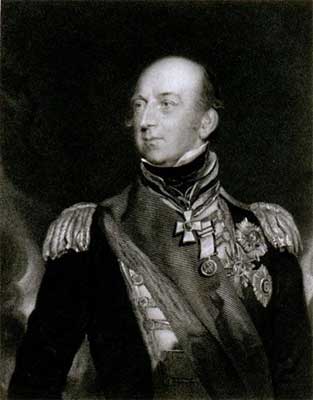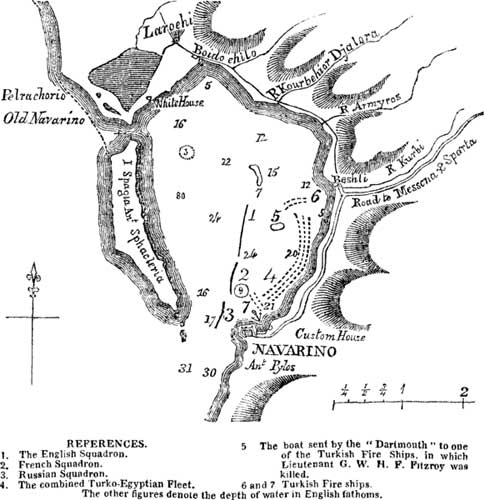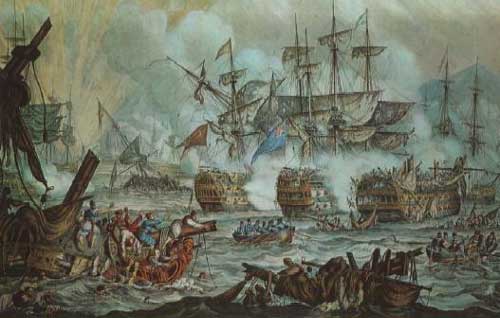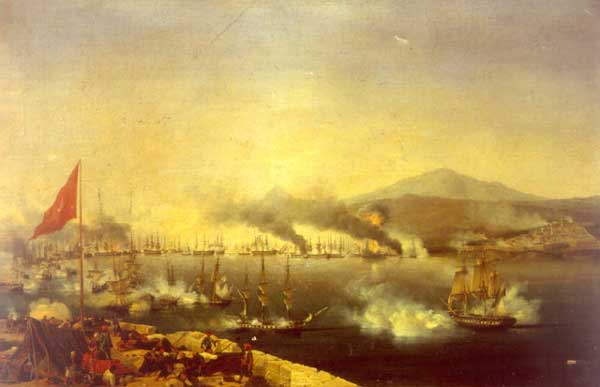|
Battle of Navarino. 0ctober 20th. 1827.
The last battle to ever be fought between sailing ships Introduction. In 1821 a Greek revolt again began, to be followed by several years of guerilla warfare, and reprisals by the Turks. It all culminated in the Battle of Navarino with the Turko Egyptian fleet being smashed and Greece being founded as an independent nation. Greek War of Independence. By October in 1827, the combined Turkish Egyptian fleet was based at Navarino in the Peloponnese. Combined Allied Fleet.
By October 14, 1827, the combined ships of the Allied force made up 11 ships of the line, 9 Frigates and smaller craft, and they arrived off Navarino. Turkish/Egyptian ships formed up in Navarino Bay. The Turkish/Egyptian ships were drawn up in parallel lines along the curve of this bay crescent, and were anchored. Any enemy ships that would survive the onslought of the shore batteries would then be met by concentrated fire from the Turkish/Egyptian vessels. We must be aware that at this time there was no formal state of war between the Allies and Turkey or Egypt. The allies test the resolve of the Turks/ Egyptians. Codrington at 1400 ( 2 PM ) on October 20 took his fleet into Navarino Bay, to show his peaceful intent, all gun ports were closed, and bands played on deck. Egyptian Ibrahian Pasha in command warned Admiral Codrington he had no permission to enter the bay, and demanded a withdrawal. Codrington haughtily replied " I am here to give the orders, not to take them." and followed up by stating if the Turks/Egyptians opened fire he would destroy their fleet. His flagship Asia anchored astern of two French ships, then in line were Genoa and Albion, two more French ships, the Russian fleet anchored in line directly in the rear, and blocking the Western arm of the Turkish/Egyptian fleet. The Eastern arm of the bay was covered by Dartmouth and the Frigate Rose. HMS Cambrian anchored between the harbour defences and the shore fort, whilst Glasgow and Talbot were ready to join Cambrian to engage if necessary any of the shore batteries.
Two allied boats fired on. A second boat carrying a formal request to Ibrahim Pasha to end all land fighting and conform to an armistice, was also fired on, killing the Fleet Pilot. Admiral Codrington now had all the provocation he needed, Asia opened fire on two, now enemy battleships, and then the combined fleet poured gun fire into the Turkish/Egyptian ships. The Allies although outnumbered in ships had superior fire power, better trained personnel, as the battle raged for four hours. The Turks and Egyptians were hamstrung by the outer line of their ships impeding the line of sight of the guns in the next two lines. It was akin to Shooting fish in a barrel for the allies. Cambrian in the harbour entrance and Glasgow beyond her, sent broadsides into the land defences, it was all planned brilliantly, and by 1800 ( 6 PM ) it was all over, and fire ceased. Table of Combatant Ships Table of Combatant Ships
Source: Compiled from information in W. James Naval History of Great Britain (London, 1837) Vol.VI pp476-89
Results. Turks/Egyptians had 3,000 killed and another 1,100 wounded, the allied casualities reported as 181 killed and 480 wounded, but no ships were lost, although three needed to go home to England for repairs. Outcry against Codrington. Conclusion. The Battle of Navarino was the last major naval battle to be fought entirely by sailing ships, thus an era had ended. |




